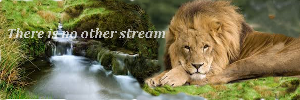While reading the chapter about Coriakin and the Dufflepuds in the Dawn Treader, I've noticed a funny detail, namely that the Duflepuds wear fancy shoes (at least in the illustration by Pauline Baynes; it was created during C. S. Lewis' life, so I guess it matched his vision), while Coriakin goes barefoot.


I thought it could be symbolic in the sense that the Duffers take themselves very seriously and care a lot about their looks, while Coriakin is self-ironic and quite eccentric in Dumbledore-escue fashion (the bearded mirror clearly implies this). Shoes, in general, are a marker of social status (with beggars and crazy people traditionally depicted barefoot in Victorian era fiction), and Coriakin going barefoot implies that he doesn't care.
I also thought this could be the reason why the Duffers didn't want to obey Coriakin, I imagine their reaction was something like:
"What, we have to obey this crazy old man who doesn't even have footwear?"
And after he transformed them into Monopods, they were like: "Ok, guess we do have to obey him, but only because he has magical power".
What do you think?
It does sound plausible. They're conceited to begin with, so it's easy to imagine them finding fault with Coriakin based on his apparel.
Or maybe they were just secretly jealous of his awesome beard! ![]()
PM me to join the Search for the Seven Swords!
Co-founder of the newly restored Edmund Club!
Did I mention I have a YouTube Channel?: https://m.youtube.com/channel/UCeuUaOTFts5BQV3c-CPlo_g
Check out my site: https://madpoetscave.weebly.com
signature by aileth
One more idea that came to my mind, is that the Dufflepuds read like a perfect caricature of human political parties, military, etc., with their unquestioning obedience to their Chief and the way they used weapons against Caspian's crew. Coriakin, on the other hand, is more of a sagacious figure like Socrates or Christian saints. In real life, people like Coriakin usually have to obey the will of the "Dufflepuds", rather than the other way round (Socrates was convicted and sentenced to drink hemlock, and many saints and sages faced injustice from the state and society), so this role reversal looks a bit like a retribution. I even thought that perhaps the Dufflepuds were human politicians and warlords in their past lives, just like Coriakin was a star? A similar idea was present in Gargantua and Pantagruel, where the sages and philosophers like Diogenes became great lords in the afterlife, and the kings like Alexander the Great were their servants.
I actually really like this new interpretation that you've put out Mickey, Coriakin had reminded me of some historical figure, and I couldn't put my finger on it, and now I think it was Socrates lol.
I actually wish they had keep more of this hermit-like look to Coriakin in the Voyage of the Dawn Treader, (I noticed he had pointed shoes on then) it would've been nice to see that dynamic of Coriakin not being a pompous or arrogant master, but more confuzzled and weary wise.
I agree, that the Dufflepuds had thought less of Coriakin for his appearance rather than his inner virtues. They were never the most sure-footed people, and I think their opinion of him lessened even more, when they were reduced to a foot, while Coriakin was afoot everywhere and chose not wear shoes. Maybe they thought of him as selfish, even though he had turned them into monopods, he still strode around barefoot, almost taunting them (they would think).
I am confused however, as to why they would put themselves up to nap in between, fanning themselves, while Coriakin was present (even thought he couldn't see them).
"They had been lying flat on their backs each with its single leg straight up in the air and its enormous foot spread out above it. She learned afterwards that this was their ordinary way of resting; for the foot kept off both rain and sun and for a Monopod to lie under its own foot is almost as good as being in a tent" (The Dufflepuds Made Happy - The Voyage of the Dawn Treader)
If shoes are a marker of status, wouldn't they have a 'ritual' of some sort, where they only remove shoes in the shadows. Or maybe fanning themselves on the lawn was a sort of trump to Coriakin, to show how they were arch enemies, giving him the heel and all that.
Another thing to add is that I find it funny that they were always hopping on one foot to travel anywhere, a quite literal embodiment of how they spring to conclusions about anything.
The 'Pevensies' irl:
@highkingpete
@queensuthegentle
@kingedthejust
@queenluthevaliant
A Narnian Fan Survey!: https://forms.gle/cGghFjQyxmA4jPGq6
@highkingpete Thank you!!! ?
I think Coriakin is somewhat closer to his book appearance in the BBC version: https://youtu.be/S8LW9Zi6IFs?t=1266
In fact, Dufflepuds still do wear shoes while they're napping, at least if the book illustration is to be trusted (see the file attached).
As for their nonchalance, Coriakin himself mentions that they're like that: one second they believe he's always watching them, and the next second they think they can outsmart him with tricks that a baby would see through.
Also, I've noticed a common misconception among readers that the Dufflepuds are relaxed and fun-loving, and Coriakin is a serious and boring mentor. In reality, it's exactly the opposite: the Dufflepuds are dead serious about everything, and that's why they're funny. Coriakin, on the contrary, is ironic; he laughs not only at the Dufflepuds, but at himself as well, and he's not afraid of appearing crazy or eccentric (like Dumbledore, Gandalf or Yoda). That's why we're laughing at Dufflepuds, but with Coriakin.

